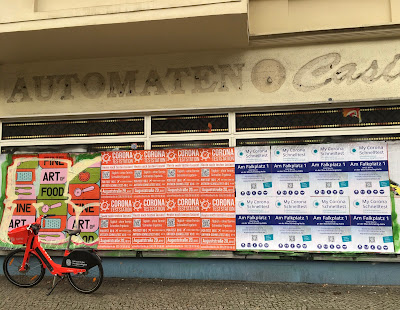Berlin is slowly emerging from months of lockdown. With the incidence number now well below 100, the emergency brake is no longer in place. So, no more curfew and no more appointments to enter a shop, though you still need to show proof of a negative Covid test, or you need to be fully vaccinated.
Beer gardens and outdoor restaurants reopen for Whitsun
The Berlin government has decided to relax other coronavirus restrictions. Museums, outdoor cinemas, beer gardens, cafés and restaurants with outdoor seating, as well as outdoor swimming pools, have all reopened this week, in time for Whitsun (Pfingsten in German), though with limitations and proof of a negative Covid test or vaccination certificate required. Even the football stadium reopened to 2,000 Union Berlin fans yesterday. Shame about the weather, not ideal for outdoor swimming!
No change to schools
You would have thought that reopening schools would have been one of the local government’s priorities, especially now that children wear surgical masks all the time and are tested for Covid twice a week. Well think again. The Berlin Senate Department for Education, Youth and Family has decided that schools will not return to normal before the start of the summer holidays, regardless of the incidence number. The reason indicated is to avoid burdening schools with organisational changes so close to the summer holidays, which begin on 24 June. Apparently, it’s not worth disrupting the status quo “only” for five weeks. This means that schools will continue to function on a part-time basis, with pupils attending only a few hours a week.
Children and families
Children in Berlin have not had access to regular schooling since mid-December. At the moment, all pupils in Berlin are allowed to go to school, but classes are halved so this means they are taught only for a few hours a day or a couple of days per week, depending on the decision taken by each individual school. As well as being extremely damaging to children’s education, social development and mental well-being, this model called Wechselunterricht also puts an enormous strain on families, because children have to be home-schooled when they can’t physically attend. Just to give you an idea, my son used to have 28 hours of lessons at school per week. Since the end of February, when schools reopened, he has only attended for 12 or 13 hours per week. The rest of the time he has been studying at home with me.
Children have a right to education
In my opinion, children in Berlin are being denied their right to an education. It seems that it’s more important to boost alcohol consumption in pubs than to teach children in a school environment in the company of other children. My eight-year-old hasn’t seen some of his school friends for five months or has only been able to wave at them from behind school gates. I’m not the only one to be concerned about children’s mental health. A group of 27 pediatricians, psychiatrists and social workers have signed a letter to the mayor Michael Müller and the education senator Sandra Scheeres demanding the immediate return to regular school. They have witnessed a worrying increase in the number of children and young people suffering from depression, media addiction and weight problems in recent months.
Sign the petition
There is an online petition asking for schools to return to normal, in view of lower incidence numbers. So far it has reached 3,400 signatures, which doesn’t seem a lot considering Berlin has a population of 3.8 million. Some parents are clearly outraged, while others seem to agree with the decision or are not too bothered. They’re simply holding out until the holidays. Some say it’s because incidence numbers amongst children are higher, while others point out that not all teachers have been vaccinated. This may be true, but it’s not the reason given by the senate. To me it is a matter of principle. Why can 2,000 fans celebrate and drink beer outside the stadium without any social distancing, when children can’t go to school normally? It seems absurd. What do you think? Will you sign the petition?
















